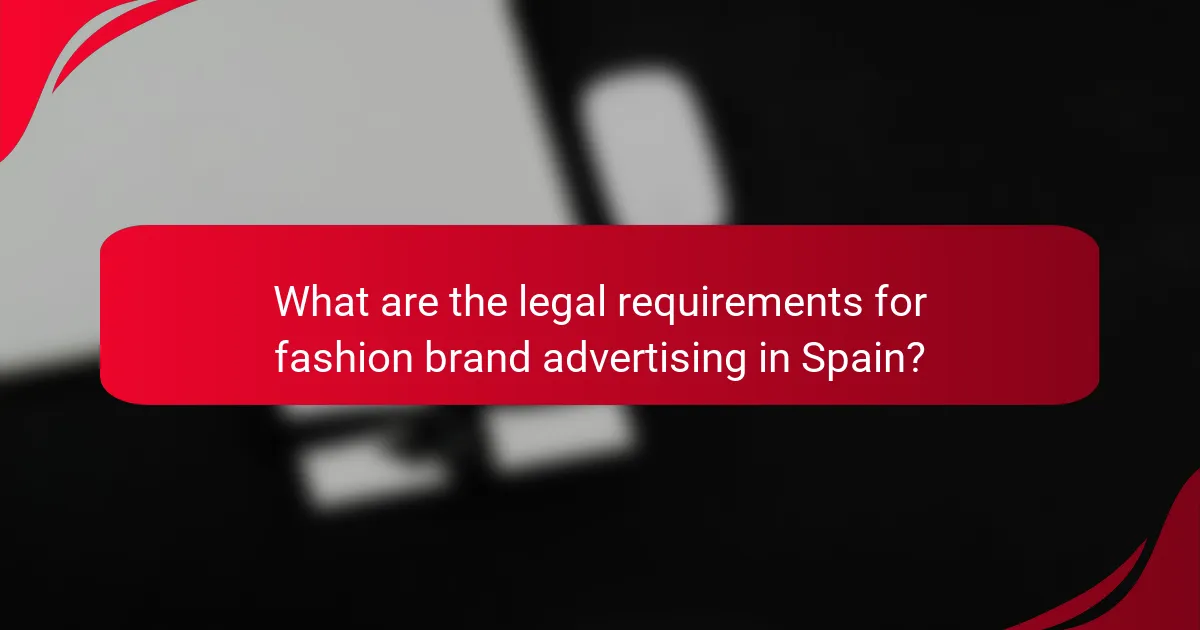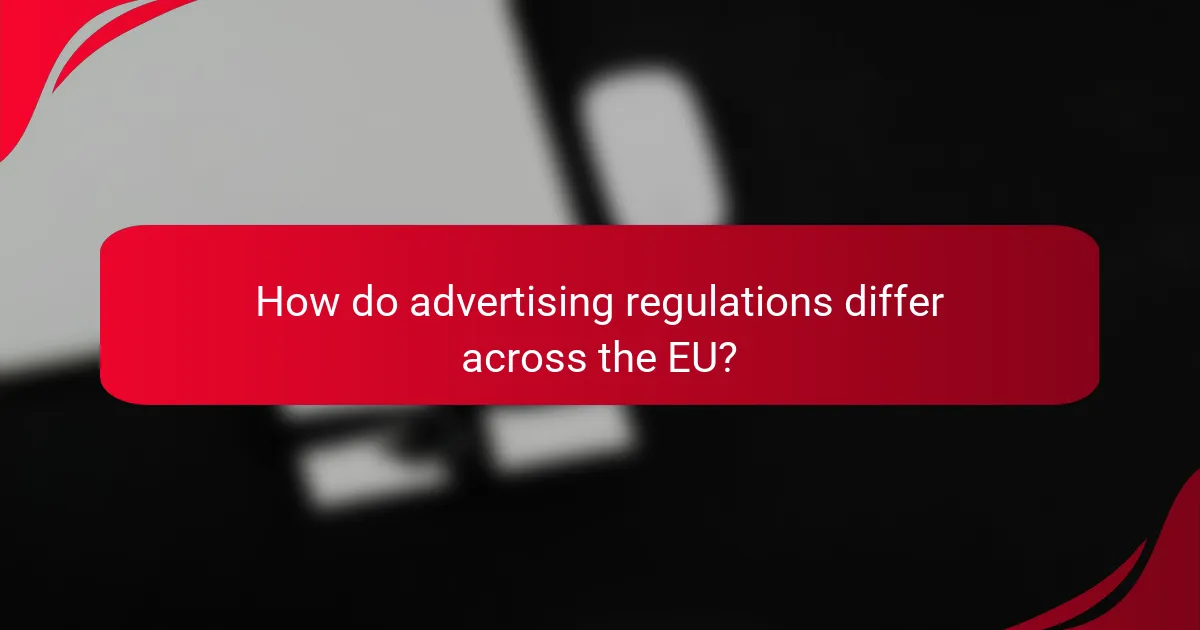Advertising for fashion brands in Spain is governed by a framework of national and European regulations aimed at ensuring transparency and consumer protection. Compliance with these laws, including Spanish advertising standards and EU directives, is essential to avoid legal repercussions and maintain a positive brand image. By understanding local regulations and implementing effective internal guidelines, fashion brands can mitigate risks and enhance their reputation in the market.

What are the legal requirements for fashion brand advertising in Spain?
Fashion brand advertising in Spain must comply with specific national and European regulations to ensure transparency, fairness, and consumer protection. Key requirements include adherence to Spanish advertising laws, EU regulations, consumer protection laws, and considerations regarding intellectual property rights.
Compliance with Spanish advertising laws
Spanish advertising laws are governed primarily by the General Law on Advertising, which mandates that advertisements must be legal, honest, and truthful. Brands should avoid misleading claims and ensure that their advertisements do not exploit vulnerable groups, such as minors.
Additionally, specific sectors, such as cosmetics and food, have stricter regulations that fashion brands must consider if their products overlap. Non-compliance can lead to fines or restrictions on advertising practices.
Adherence to EU regulations
Fashion brands operating in Spain must also comply with EU advertising regulations, including the Unfair Commercial Practices Directive. This directive prohibits misleading advertising and aggressive marketing tactics that could distort consumer choices.
Brands should be aware of the rules concerning comparative advertising, which allows them to compare products but requires that comparisons be fair and not misleading. Violating these regulations can result in significant penalties across EU member states.
Consumer protection laws
Consumer protection laws in Spain, particularly the Consumer Protection Act, require that advertisements provide clear and accurate information about products. This includes details on pricing, terms of sale, and any potential risks associated with the product.
Brands must also respect the right of consumers to withdraw from a purchase within a specified period, typically 14 days, without incurring penalties. Failure to comply with these laws can lead to legal disputes and damage to brand reputation.
Intellectual property considerations
Intellectual property rights are crucial for fashion brands in Spain, as they protect trademarks, designs, and copyrights. Brands must ensure that their advertising does not infringe on the intellectual property rights of others, which could lead to lawsuits and financial losses.
It is advisable for brands to conduct thorough checks to ensure that their logos, slogans, and product designs are not already registered by other entities. Registering trademarks and designs can provide legal protection and enhance brand value in the competitive market.

How can fashion brands ensure compliance with advertising standards in Spain?
Fashion brands can ensure compliance with advertising standards in Spain by understanding and adhering to local regulations, conducting thorough audits, and implementing robust internal guidelines. This proactive approach minimizes legal risks and enhances brand reputation.
Conducting legal audits
Conducting legal audits involves reviewing all advertising materials to ensure they meet Spanish advertising laws and regulations. Brands should assess their campaigns for compliance with truthfulness, decency, and respect for consumer rights.
Regular audits can help identify potential issues before they escalate. For instance, brands should check that claims about products are substantiated and that any endorsements comply with local advertising standards.
Consulting with legal experts
Consulting with legal experts is crucial for navigating the complexities of advertising law in Spain. Legal professionals can provide insights into specific regulations, such as the General Law on Advertising and the Consumer Protection Law.
Engaging legal counsel can help brands avoid common pitfalls, such as misleading advertising or failure to disclose sponsorships. This collaboration ensures that advertising strategies align with legal requirements and industry best practices.
Implementing internal guidelines
Implementing internal guidelines is essential for maintaining compliance across all advertising efforts. Brands should develop clear policies that outline acceptable advertising practices and establish procedures for reviewing content before publication.
Training employees on these guidelines can foster a culture of compliance. Regular updates to the guidelines, reflecting changes in laws or industry standards, will keep the brand aligned with current regulations.

What are the consequences of non-compliance in Spain?
Non-compliance with advertising regulations in Spain can lead to significant consequences, including financial penalties, damage to brand reputation, and potential legal disputes. Fashion brands must adhere to local laws to avoid these repercussions.
Fines and penalties
In Spain, fines for non-compliance with advertising regulations can vary widely, often ranging from hundreds to thousands of euros, depending on the severity of the violation. For example, misleading advertising may incur fines that can reach up to 4% of a company’s annual revenue.
Additionally, repeated offenses can lead to increased penalties, including the possibility of temporary bans on advertising activities. Brands should regularly review their advertising practices to ensure compliance and avoid these financial repercussions.
Reputational damage
Non-compliance can severely harm a fashion brand’s reputation, leading to loss of consumer trust and loyalty. Negative publicity from legal actions or fines can deter potential customers and damage relationships with partners and stakeholders.
To mitigate reputational risks, brands should prioritize transparency in their advertising and engage in ethical marketing practices. Building a positive brand image is crucial for long-term success in the competitive fashion industry.
Legal disputes
Failure to comply with advertising laws can result in legal disputes, which may involve lawsuits from consumers or competitors. These disputes can be costly and time-consuming, diverting resources away from core business activities.
Brands should implement robust compliance programs and seek legal counsel to navigate the complexities of advertising regulations in Spain. Proactive measures can help prevent disputes and ensure that advertising campaigns align with legal standards.

What ethical considerations should fashion brands keep in mind?
Fashion brands in Spain must prioritize ethical considerations such as truthfulness in advertising, transparency in influencer partnerships, and respect for cultural sensitivities. These factors not only enhance brand reputation but also foster consumer trust and loyalty.
Truthfulness in advertising
Truthfulness in advertising is crucial for maintaining credibility. Brands should ensure that all claims about their products are accurate and not misleading. For instance, if a garment is marketed as “eco-friendly,” it should meet recognized environmental standards.
To avoid pitfalls, brands should conduct thorough research and verification before making any claims. Misleading advertisements can lead to legal repercussions and damage to brand integrity.
Transparency in influencer partnerships
Transparency in influencer partnerships is essential for ethical marketing practices. Brands should clearly disclose any paid collaborations or sponsorships to their audience. This builds trust and aligns with the expectations of consumers in Spain, where regulations require clear labeling of sponsored content.
Brands can implement straightforward guidelines for influencers, such as using hashtags like #ad or #sponsored. This not only complies with legal standards but also enhances authenticity in the brand’s messaging.
Respect for cultural sensitivities
Respecting cultural sensitivities is vital for fashion brands operating in Spain, a country rich in diverse traditions and values. Brands should be mindful of cultural symbols and avoid appropriating or misrepresenting them in their advertising.
Conducting cultural research and engaging with local communities can help brands navigate these complexities. A simple misstep, such as using culturally significant imagery without understanding its context, can lead to backlash and reputational harm.

How do advertising regulations differ across the EU?
Advertising regulations in the EU vary significantly from country to country, impacting how fashion brands can promote their products. In Spain, brands must navigate both EU-wide directives and local laws that dictate advertising practices, consumer protection, and content restrictions.
Variations in consumer protection laws
Consumer protection laws across the EU can differ in terms of enforcement and specific requirements. In Spain, the General Law for the Defense of Consumers and Users sets strict standards for advertising, ensuring that claims are truthful and not misleading. Brands must be cautious to comply with these regulations to avoid penalties.
For example, claims about product quality or origin must be substantiated, and any promotional offers must be clear and not deceptive. This contrasts with some other EU countries where regulations may be less stringent, allowing for more flexibility in advertising claims.
Differences in advertising content restrictions
Content restrictions for advertising can vary widely across EU member states. In Spain, there are specific rules regarding the portrayal of certain products, especially those related to health and beauty. For instance, advertisements for cosmetics must not imply that the product can alter physical appearance in unrealistic ways.
Additionally, Spain has regulations against advertising aimed at children that could exploit their inexperience. Brands must ensure that their advertising content adheres to these local standards while also considering broader EU regulations that may apply.
Cross-border advertising challenges
Cross-border advertising can present unique challenges for fashion brands operating in multiple EU countries. Differences in regulations mean that a campaign successful in one country may not be compliant in another. Brands must conduct thorough research to understand the legal landscape in each market they enter.
For example, a promotional campaign that is acceptable in Spain might face restrictions in Germany due to stricter content regulations. To navigate these complexities, brands should consider consulting with legal experts familiar with advertising laws in each target country to ensure compliance and avoid costly legal issues.

What role does social media play in fashion brand advertising?
Social media is crucial for fashion brand advertising, providing platforms for direct engagement with consumers and showcasing products visually. Brands leverage social media to build their identity, reach wider audiences, and drive sales through targeted campaigns.
Influencer marketing regulations
In Spain, influencer marketing is subject to specific regulations that ensure transparency and consumer protection. Influencers must disclose paid partnerships clearly, typically by using hashtags like #ad or #publicidad. This transparency helps maintain trust between brands and consumers.
Brands should also be aware of the Advertising Code of Conduct, which mandates that advertising must not mislead consumers. Non-compliance can lead to penalties or damage to brand reputation.
Platform-specific advertising guidelines
Each social media platform has its own advertising guidelines that fashion brands must follow. For instance, Instagram requires that ads be clearly marked and comply with community standards regarding content. Brands should familiarize themselves with these rules to avoid ad rejections or account suspensions.
Additionally, Facebook and TikTok have specific requirements for ad formats and targeting options. Understanding these guidelines helps brands optimize their advertising strategies and maximize engagement with their target audience.










